Food experts have raised alarm over the widespread use of hazardous pesticides in Nigeria, linking it to the increasing prevalence of food-related illnesses across the country. The concerns were voiced during a technical workshop on “Pesticide Regulatory and Agrochemicals Accountability,” organized in Abuja by the Health of Mother Earth Foundation (HOMEF) and the Heinrich Böll Foundation.
Professor Simon Irtwange, an agricultural processing and storage expert from the Federal University, Makurdi, revealed that over 50% of registered pesticides in Nigeria are classified as Highly Hazardous Pesticides (HHPs), many of which are banned in Europe. These chemicals, he noted, pose serious risks to both farmers and consumers.
“Eighty percent of rural farmers in Nigeria are unaware of the chemicals they apply to their farms, and most consumers remain ignorant of the pesticide residues present in their food,” Irtwange said. He further explained that farmers often struggle to read pesticide labels, which are usually written in English rather than local languages, compounding the problem.
Irtwange disclosed that Nigeria’s food exports have suffered significantly, with the European Union and Asia rejecting over 76% of Nigerian agricultural products in the past decade due to pesticide contamination. Rejected products include beans, sesame seeds, melon seeds, dried fish, dried meat, and palm oil, among others.
He also highlighted the health risks associated with HHPs, including cancer, kidney disease, reproductive issues, hormonal imbalances, and environmental damage. Despite a 2022 ban on the hawking of chemical formulations by NAFDAC, hazardous pesticides remain widely available and poorly regulated across the country.
The professor proposed a Farmer’s Bill of Rights and a Consumer’s Bill of Rights to protect individuals involved in the food chain. These measures would ensure safety, proper monitoring, access to information, and compensation for those affected by harmful pesticide use.
“Farmers and consumers must be educated about the chemicals they use and consume. They should have access to protective equipment and oversight to safeguard their health and livelihoods,” Irtwange emphasized.
The workshop concluded with calls for stricter regulation of pesticide distribution and increased awareness campaigns to mitigate the risks associated with hazardous agrochemicals.




